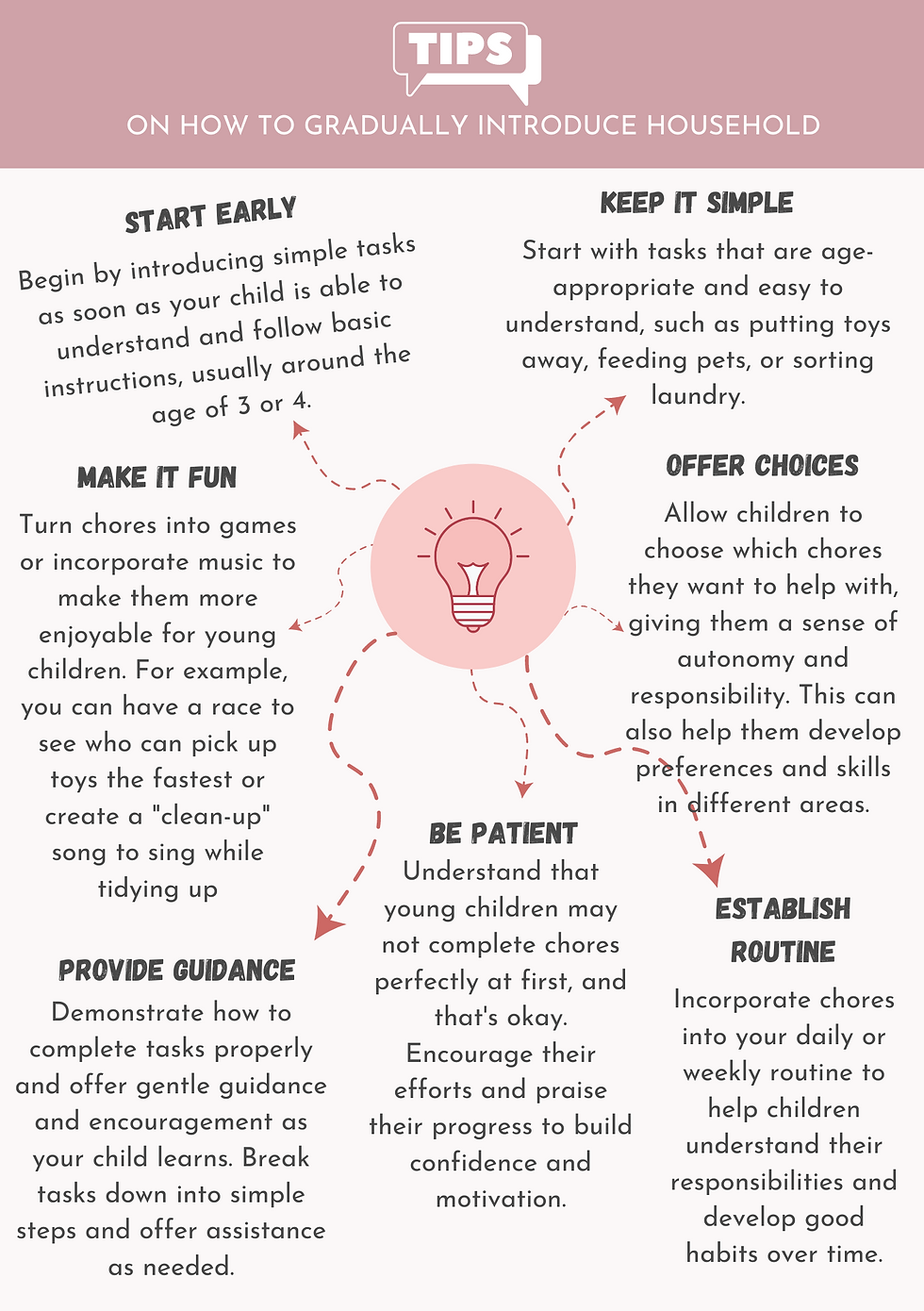Fostering Independence in Toddlers and Preschoolers: The Power of Household Chores
- The STEM Nanny Company
- Jul 22, 2024
- 3 min read
As parents and nannies, we often find ourselves torn between nurturing our young children’s desire for independence and ensuring their safety and well-being. It's a delicate balance, but one that is crucial for their development and growth. In this blog post, we'll explore why fostering independence in young children is valuable, how household chores can serve as outlets for their burgeoning autonomy, and practical tips for gradually introducing chores to young children.

Why Independence Matters?
Toddlers and preschoolers are at a stage of rapid development, where they're consistently discovering new abilities and asserting their autonomy. From learning to walk and talk to expressing their preferences and asserting their independence, these early years are critical for laying the foundation for future success. Encouraging independence not only fosters a sense of confidence and self-esteem but also helps children develop essential life skills that will serve them well throughout their lives.
Household Chores as Outlets for Autonomy
Household chores can serve as valuable outlets for young children to exercise their autonomy and assert their independence in a safe and supervised environment. Simple tasks like putting away toys, setting the table, or watering plants give children a sense of ownership and responsibility, allowing them to contribute to the family or community and feel like valued members of the household. By involving children in household chores, parents and nannies can empower them to take on age-appropriate responsibilities and build confidence in their abilities.
Promoting Self-Confidence and Refining Motor Skills
Engaging in household chores not only promotes self-confidence but also helps toddlers and preschoolers refine their motor skills and coordination. Whether it's pouring water into a cup, sorting laundry into different piles, or sweeping the floor, these activities provide valuable opportunities for children to practice fine and gross motor skills in a meaningful context. As they master new tasks and see the tangible results of their efforts, children gain a sense of pride and accomplishment that boosts their self-esteem and encourages further exploration and learning.
Gradually Introducing Household Chores
Introducing household chores to young children should be done gradually and with patience. Start by choosing age-appropriate tasks that align with your child's interests and abilities. Offer clear and simple instructions, demonstrate how to complete the task, and provide plenty of encouragement and praise along the way. Make chores fun by turning them into games or incorporating music and storytelling. As children grow and develop, gradually increase the complexity of the tasks and offer opportunities for them to take on more responsibility.

Here are some age-appropriate chores that can help foster independence in young children:
Putting Away Toys

Teach children to tidy up their toys and belongings after playtime. This chore encourages organization skills and teaches children to take responsibility for their own belongings.
Setting the Table and Clearing the Table

Have children help set the table before meals by placing utensils, napkins, and dishes in their proper places. This task promotes fine motor skills and teaches children the importance of contributing to family routines. After meals, have children assist in clearing dishes from the table and placing them in the sink or dishwasher. This chore teaches responsibility and teamwork, as well as the importance of helping with household tasks.
Feeding Pets

If you have pets, involve children in feeding and caring for them. This chore teaches children empathy and responsibility for the well-being of animals, while also instilling a sense of routine and accountability.
Watering Plants

Assign children the task of watering indoor or outdoor plants. This chore helps children learn about plant care and responsibility for living things, while also promoting a connection to nature.
Sorting Laundry

Teach children to sort laundry into different piles based on color or type of clothing. This chore helps develop categorization skills and introduces children to basic household tasks.
Making the Bed

Encourage children to help make their own bed each morning. This chore promotes independence and self-care, while also teaching children the importance of tidiness and organization.
Sweeping or Dusting

Give children a small broom or duster and encourage them to help sweep or dust surfaces around the house. This chore teaches children about cleanliness and contributes to a sense of pride in maintaining their living space.
Folding Towels

Show children how to fold towels neatly and assign them the task of folding and putting away towels after they have been washed. This chore helps develop fine motor skills and organization skills, while also teaching children the value of completing tasks from start to finish.
Wiping Surfaces

Provide children with a damp cloth and teach them to wipe down surfaces such as countertops or tables. This chore promotes cleanliness and teaches children to take pride in their living environment.
By introducing these age-appropriate household chores to young children, parents can help foster independence, responsibility, and essential life skills that will serve them well as they grow older. It's important to offer guidance and support as children learn new tasks, and to praise their efforts and accomplishments along the way.
In conclusion, fostering independence in toddlers and preschoolers is essential for their overall development and well-being. Household chores provide valuable opportunities for children to assert their autonomy, build self-confidence, and refine motor skills. By gradually introducing chores in a supportive and encouraging environment, parents and nannies can empower their children to become capable, confident, and independent individuals.
Navigating the journey of fostering independence in your toddlers and preschoolers can be filled with joy and challenges alike. Understanding the importance of this developmental stage is crucial, and sometimes, having an expert guide can make all the difference. That's where we come in.
We're dedicated to supporting families like yours through every step of early childhood development. Our Guide to Fostering Independence offers practical tips, heartfelt advice, and the insights you need to empower your little ones in the most nurturing ways. Let's embark on this journey together, ensuring a brighter, more independent future for our children.




Comments